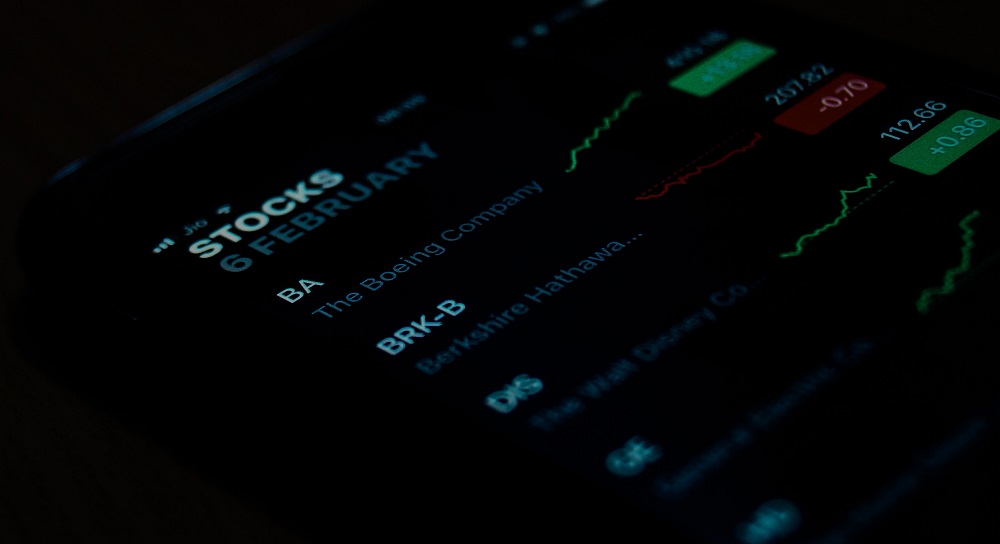Tech has been a big part of ESG portfolios because their carbon footprints tend to be lower than their peers in other industries. They also have policies in place on issues like diversity and human rights that make up for an outsized proportion of public markets due to their huge size.
However, the recent plunge in technology shares is teaching investors a harsh lesson in the reflexivity of stock-based compensation. The scenario is acting as a tailwind for companies, lighting up how a collapse in stock prices can threaten cash flow.

The world’s largest funds concentrated on ethically minded investments have plummeted this year as their heavy weighting towards tech stocks has left them at the center of the ongoing market squall.
With $25.9bn under management, Parnassus Core Equity Fund fell by over 18 percent in 2022, while Vanguard’s $14.3bn FTSE Social Index fund is down by over 22.5 percent. Technology is the leading sector in both funds, making 30 percent of the Vanguard fund’s investments and over a fifth of Parnassus’. Other big ESG funds have also met the same fate this year.
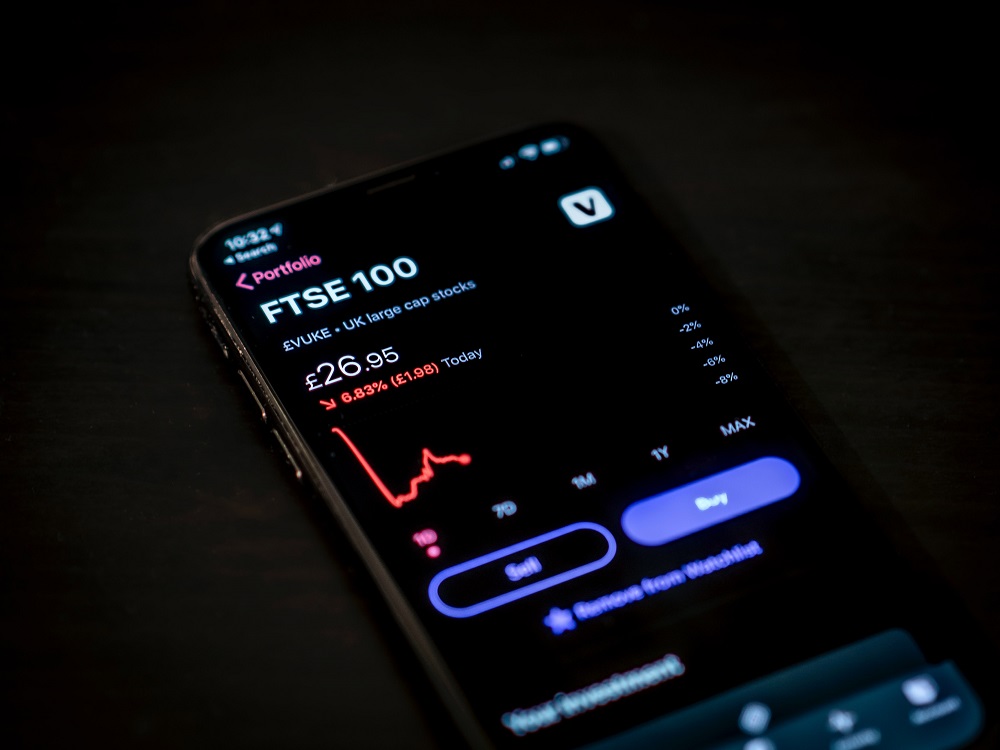
The gloomy performance draws a sharp contrast to the recent outperformance of ESG funds when big rallies in tech stocks during the pandemic assisted in boosting funds focused on environmental, social, and governance standards.
Read more: Embracing Communication: Why It Plays a Crucial Part in ESG Strategy Planning
The Collateral Damage: ESG Funds & Tech Stocks
Piggybacking on outsized gains in recent years boosted the performance of large ESG funds. But today, due to the current shakeout in the tech sector, the ESG funds are suffering collateral damage. With tech firms suffering the loss, oil and gas companies that tend to make up a tiny share of ESG portfolios, on the contrary, have rallied strongly this year,
The issue is not purely from an ESG perspective, but it is rather a broad market problem. Funds that offer bigger organizations larger weightings inherently allocate a greater proportion of their assets to such companies due to their enormous market values.
While taking a large position in tech mirrors a broad composition of markets, investors in sustainable funds are paying a premium for these strategies compared to their conventional peers. Average expenses ratios for ESG funds are 0.61 % when compared with 0.41 percent for traditional ones, as reported by Morningstar.
Investor enthusiasm for ESG products reduced as performance faltered in the initial months of this year. Sustainable funds brought in $97bn of new investment in the first quarter, a fall of just over 35 % when compared with the previous quarter, denoting the sharpest slowdown in three years. But despite the slump, investor flows into ESG funds held up better than the broader market.

The ESG funds inflows slid by 73 % in the same period as investors worried about rising interest rates due to the Fed policies, high inflation, and the Russia-Ukraine tension. ESG funds under management topped $2.77tn in March 2022, three times their level in 2019.
Investors are continuing to flock to the environmental, social, and corporate governance (ESG) stock fund despite a slide in Big Tech hitting the funds' performance. At the same time, the market braces for more growth wobbles in the year ahead, and a large part of the investing universe is valuing alignment over precedence.
ESG’s Biggest Concern: The Federal Reserve
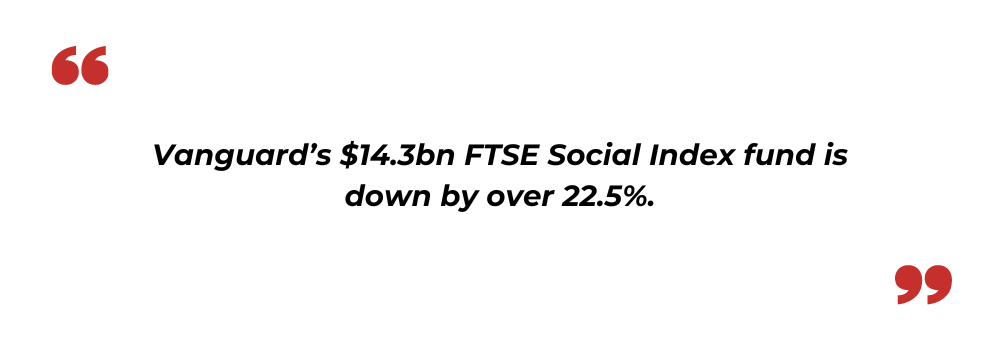
The Fed’s new inflation-fighting policies hit stocks hard at the beginning of 2022. Due to this, some of the biggest losers were fast-growing technology companies that likely suffer when interest rates rise.
In 2022, the Fed's new stance has hit Snap Inc. (SNAP) and Netflix Inc. (NFLX), plunging them down by 33% and 27%, respectively. Both scores well on ESG metrics. As ESG funds trade at a higher price-to-earnings ratio than the overall market, investors are now susceptible to volatility and lower future returns.
Shares of crypto exchange Coinbase, which has been trading publicly for less than one month, are also down by 2%, pushing the stock down 15% from a high less than two weeks ago. The company's market capitalization is now just about half of what it was at its peak.
Read more: ESG & Sustainability: Top ESG Challenges for Companies to Tackle in 2022

The Downturn for Tech Corporations
For younger tech workers, their first experience of a really vicious bear market comes as an unpleasant shock. For the entirety of the past decade, tech companies only showered them with wealth.
Markets cannot seem to be catching a bid for two days in a row. While investors are eager to buy a dip, the breakthrough of some negative news shatters their confidence amid the heightened market uncertainty. With stocks attempting to rebound from their previous selloff, investors are relentlessly feeling the selling pressure due to the rising fear of inflation, leading to an economic downturn.
Big-tech earnings smashed expectations, including Apple, which fell by 0.1% after a blowout. Currently, the main problem in the market is ongoing weakness in tech, as investors are continuing to sell off their shares after chasing the sector's massive recovery last year.
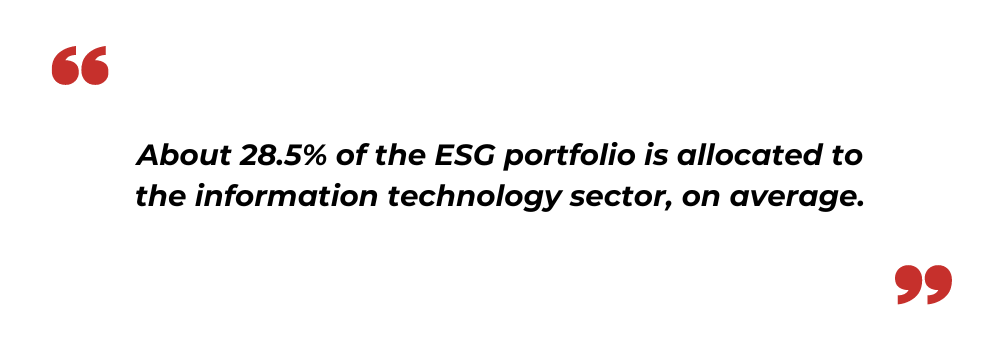
The Price Economy must Pay
With the global transition of organizations to a low-carbon economy gaining pace, institutional investors are increasingly finding themselves being graded on the sustainability of their holdings and the asset flow of funds focused on finding ESG.
Data shared with Reuters signifies that the globally focused ESG stock funds took in a net $622.28 million in the initial month of 2022, compared with $543.56 million flowing to non-ESG stock funds.
Even though January was recorded as the worst month in over three years for the technology-heavy Nasdaq index and its tech components, money kept flowing. Reason being- The ESG funds were favored for their low emissions and high scores from ESG data providers.
The ESG funds paid the price of their over-allocation to tech stocks. About 28.5% of the ESG portfolio is allocated to the information technology sector on average, compared to 23% for MSCI World. The flow of ESG funds was also buoyed in part by some asset managers who re-labeled their plain funds as ESG funds and changed their investment mandates. However, the relative performance of ESG funds has been hampered due to their aversion by many managers to the fossil fuel industry, which surged in recent months due to a supply crunch.

Read more: Why Should Companies Develop Women Leadership to Influence Corporate ESG Operating Models?
Key Insights
-
The Dow Jones Industrial Average rose by 0.2%, nearly 100 points, whereas the S&P 500 lost 0.8% and the tech-heavy Nasdaq Composite fell by 2.4%.
-
Despite a rebound led by financial stocks, the relentless market selloff resumed with seven straight weeks of losses pushing the S&P 500 into the bear market territory.
-
Stocks are getting hit hard, and the main culprit behind it is the Snap's (Snapchat) warning. Snap’s stock fell over 40% after the company blamed its gloomy outlook on a macroeconomic environment, thus dragging shares of other tech companies lower.
-
Due to Snap's statement, online ad platforms will feel some impact of a significant consumer pullback. Following the announcement, shares of Google-parent Alphabet fell by 5%, Facebook-parent Meta nearly by 8%, Roku nearly 14%, and Pinterest by 24%.
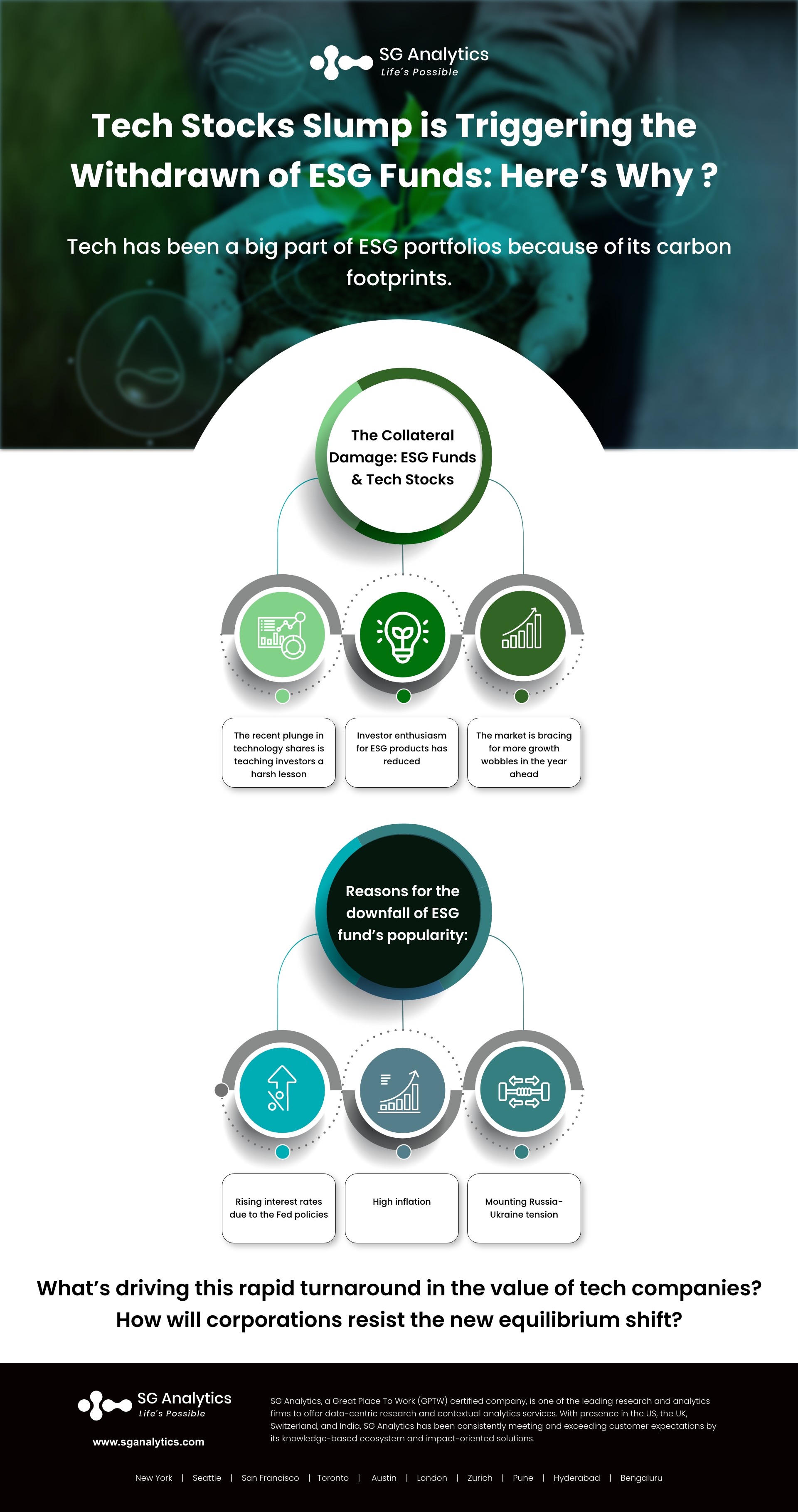
In Conclusion
After a prolonged period when it felt like tech stocks were advancing, the recent correction pushed them off the edge. Even Bitcoin took a pounding in the last few days after its recent rise.
What is driving this rapid turnaround in the value of tech companies, tech-focused indices, and tech-adjacent?
The answer is not merely one thing.
In an environment as complex as the world’s capital markets, the rising narrative is pointing toward multiple factors. Namely, as the value of money and bond yield is reducing, everyone is investing their money into the stock market trade. But it is losing its charm. As some yields rise, bonds are becoming more attractive bets. Investors are now pushing their stock market bets into other categories.
The result of this entire shift is that the landscape of value is pivoting; the interest of investors in tech companies is receding, at least for now. In the coming months, if the corporations persist until the very investment, the chances of tech stocks reaching a new equilibrium exist.
With a presence in New York, San Francisco, Austin, Seattle, Toronto, London, Zurich, Pune, Bengaluru, and Hyderabad, SG Analytics, a pioneer in Research and Analytics, offers tailor-made services to enterprises worldwide.
A leader in ESG Consulting services, SG Analytics offers bespoke sustainability consulting services and research support for informed decision-making. Contact us today if you are in search of an efficient ESG integration and management solution provider to boost your sustainable performance.


